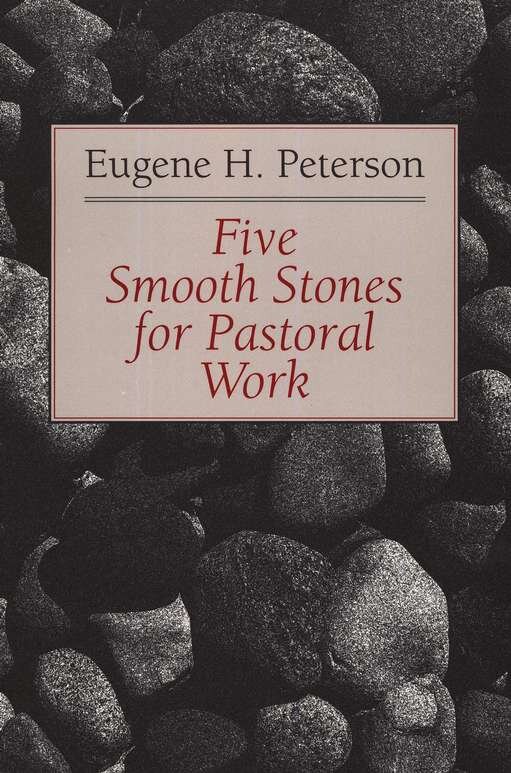Peterson, Eugene. Five Smooth Stones for Pastoral Work. Eerdmans, 1980.
Referenced in: Pastoral Theology
LifeandLeadership.com Summary
This was the first of Eugene Peterson’s work on pastoral theology. It was followed by Working the Angles (1987) The Contemplative Pastor (1989), Under the Unpredictable Plant (1992) and Pastor: A Memoir (2011).
In his usual style, he begins with lament over how the pastoral role has been sidetracked by lesser interests:
“When I look for help in developing my pastoral craft and nurturing my pastoral vocation, the one century that has the least to commend it is the twentieth. Has any century been so fascinated with gimmickry, so surfeited with fads, so addicted to nostrums, so unaware of God, so out of touch with the underground spiritual streams which water eternal life? In relation to pastoral work the present-day healing and helping disciplines are like the River Platte as described by Mark Twain, a mile wide and an inch deep. They are designed by a people without roots in an age without purpose for a people without God.” (2)
In looking for solutions, his frustration continues:
The pulpit is grounded in the prophetic and kerygmatic traditions but the church office is organized around IBM machines. The act of teaching is honed on biblical insights derived from historical, grammatical, form, and redaction criticism while the hospital visit is shaped under the supervision of psychiatrists and physicians. The sociologists, psychologists, management consultants, and community organizers of the twentieth century are brilliant. Their insights are dazzling and their instruction useful. I have profited a great deal under their tutelage, but I am ill at ease still. I can demonstrate acceptable competence in the skills I have been taught, but am I a pastor? I function adequately in a variety of dovetailed roles, but is there a biblical foundation providing solid, authoritative underpinning for what I am doing so that my daily work is congruent with the ancient ministries of prophet, priest, and wise man to which I am heir?” (4)
Eventually, Peterson found help in five Old Testament books: Song of Songs, Ruth, Lamentations, Ecclesiastes, and Esther. In the image from David’s battle with Goliath, who knelt at the brook to gather “five smooth stones, one of which will kill a giant,” so he found these as five smooth stones that would help reestablish biblical priorities to the pastoral role in a time when it has been hijacked by so many lesser emphases. He devotes a chapter to each of these stones:
- The Pastoral Work of Prayer-Directing: Song of Songs – Here he approaches the song figuratively as representing out spiritual hunger and the intimate satisfaction of relationship with God: “We never know how good we can look, how delightful we can feel or how strong we can be until we hear ourselves addressed in love by God or by the one who represents God’s love to us. [In the words of Anders Nygren] ‘That which in itself is without value acquires value by the fact that it is the object of God’s love’” (65).
- The Pastoral Work of Story-Making: Ruth – Peterson depicts Scripture as a “vast tapestry of God’s saving ways among his people” (77). Pastors, as historians, tell and retell the story through the various accounts of God’s work in an among the people.
- The Pastoral Work of Pain-Sharing: Lamentations – Here Peterson describes entering the prophetic lineage by entering the laments of people in pain, always knowing the true story laced with the oracles of hope.
- The Pastoral Work of Nay-Saying: Ecclesiastes – This moves pastors away from the Pollyanna of having solutions to all of life’s problems, but instead being able to acknowledge God’s presence even in the difficulties and untidiness of life.
- The Pastoral Work of Community-Building: Esther – Just as in this story of Mordecai and his faithful service to the people, so we must emphasize the bond we have as a community of faith in exile.
One may have difficulty seeing each of the Old Testament books as Peterson describes, but apart from this, his comments on the various roles of pasturing are excellent.
From the Publisher
Five Smooth Stones for Pastoral Work shows how five Old Testament books provide a solid foundation for much of what a pastor does: prayer-directing, story-making, pain-sharing, nay-saying and community-building. This book opens up to pastors a wealth of valuable practical-theological insights.
About the Author
Eugene H. Peterson is a pastor, scholar, writer, and poet. After teaching at a seminary and then giving nearly 30 years to church ministry in the Baltimore area, he created The Message – a vibrant Bible paraphrase that connects with today’s readers like no other.
***For additional information on this resource, including reviews, click the bookstore links. Check the reference at page top or the links below for resource guides on related topics.***
See Other Resource Guides on Pastoral Theology:
- Minister Self-Care
- Ministry Burnout, Prevening and Overcoming
- Ministry Ethics
- Ministry Support Systems
- Strengthening and Renewing the Ministry Call
- Theology of Mission and Ministry
See Resources on Over 100 Ministry Topics:


